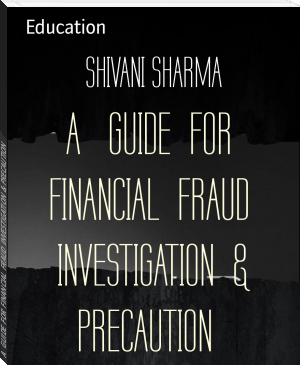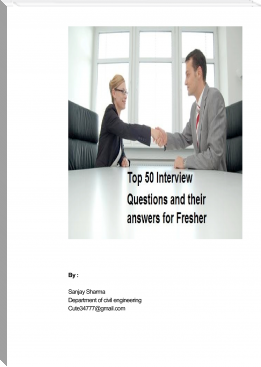A GUIDE FOR FINANCIAL FRAUD INVESTIGATION & PRECAUTION - SHIVANI SHARMA (i love reading books .TXT) 📗

- Author: SHIVANI SHARMA
Book online «A GUIDE FOR FINANCIAL FRAUD INVESTIGATION & PRECAUTION - SHIVANI SHARMA (i love reading books .TXT) 📗». Author SHIVANI SHARMA
overcome those fears, in 2010 Dodd–Frank Wall Street Reform and Consumer Protection Act was put forth to provide great incentive to whistleblowers. For example, if a whistleblower gave information which could be used to legally recover over one million dollars; then they could receive ten to thirty percent of it.
Despite government efforts to help regulate the private sector, the employees must still weigh their options.
They either expose the company and stand the moral and ethical high ground; or expose the company, lose their job, their reputation and potentially the ability to be employed again.
According to a study at the University of Pennsylvania, out of three hundred whistleblowers studied, sixty nine percent of them had foregone that exact situation; and they were either fired or were forced to retire after taking the ethical high ground.
It is outcomes like that which makes it all that much harder to accurately track how prevalent whistleblowing is in the private sector.
8)Public sector whistleblowing:-
Recognizing the public value of whistleblowing has been increasing over the last 50 years. In the United States, both state and Federal statutes have been put in place to protect whistleblowers from retaliation. The United States Supreme Court ruled that public sector whistleblowers are protected under First Amendment rights from any job retaliation when they raise flags over alleged corruption. Exposing misconduct or illegal or dishonest activity is a big fear for public employees because they feel they are going against their government and country. Private sector whistleblowing protection laws were in place long before ones for the public sector. After many federal whistleblowers were scrutinized in high-profile media cases, laws were finally introduced to protect government whistleblowers. These laws were enacted to help prevent corruption and encourage people to expose misconduct, illegal, or dishonest activity for the good of society. People who choose to act as whistleblowers often suffer retaliation from their employer. They most likely are fired because they are an at-will employee, which means they can be fired without a reason. There are exceptions in place for whistleblowers who are at-will employees. Even without a statute, numerous decisions encourage and protect whistleblowing on grounds of public policy. Statutes state that an employer shall not take any adverse employment actions any employee in retaliation for a good-faith report of a whistleblowing action or cooperating in any way in an investigation, proceeding, or lawsuit arising under said action. Federal whistleblower legislation includes a statute protecting all government employees. In the federal civil service, the government is prohibited from taking, or threatening to take, any personnel action against an employee because the employee disclosed information that he or she reasonably believed showed a violation of law, gross mismanagement, and gross waste of funds, abuse of authority, or a substantial and specific danger to public safety or health. To prevail on a claim, a federal employee must show that a protected disclosure was made, that the accused official knew of the disclosure, that retaliation resulted, and that there was a genuine connection between the retaliation and the employee's action.
9)Harm:-
Individual harm, public trust damage, and a threat of national security are three categories of harm that may come to whistleblowers. Revealing whistleblower identities automatically puts their life in harm's way. Especially with media outlets using words like "traitor" and "treason" to associate with whistleblowers. There are many countries around the world that associate treason with the death penalty, even though whoever allegedly committed treason may or may not have caused anyone physical harm. A primary reason for the death penalty would be that they have potentially endangered an entire people, therefore being responsible for any harm to come as a result. US law states,"...whoever knowingly and willfully communicates, furnishes, transmits, or otherwise makes available to an unauthorized person, or publishes, or uses in any manner prejudicial to the safety or interest of the United States or for the benefit of any foreign government to the detriment of the United States any classified information." Public trust dates back to the days of the Vietnam War. Henry Kissinger once said that the purpose of "those who stole" the Pentagon Papers was to "undermine confidence in their government" and "raise doubts about our reliability in the minds of other governments, friend and foe, and indeed about the stability of our political system." Emotional strain on the accused from the whistle blower is also unconstrained. When a leader challenges a whistle blower, there is an automatic indictment of the leader's character. Questioning the whistleblower makes the accused guilty until proven innocent
10)Common reaction:-
Whistleblowers are sometimes seen as selfless martyrs for public interest and organizational accountability; others view them as "traitors" or "defectors." Some even accuse them of solely pursuing personal glory and fame, or view their behavior as motivated by greed in qui tam cases. Some academics (such as Thomas Alured Faunce) feel that whistleblowers should at least be entitled to a rebuttable presumption that they are attempting to apply ethical principles in the face of obstacles and that whistleblowing would be more respected in governance systems if it had a firmer academic basis in virtue ethics. It is probable that many people do not even consider blowing the whistle, not only because of fear of retaliation, but also because of fear of losing their relationships at work and outside work. Persecution of whistleblowers has become a serious issue in many parts of the world: "Employees in academia, business or government might become aware of serious risks to health and the environment, but internal policies might pose threats of retaliation to those who report these early warnings. Private company employees in particular might be at risk of being fired, demoted, denied raises and so on for bringing environmental risks to the attention of appropriate authorities. Government employees could be at a similar risk for bringing threats to health or the environment to public attention, although perhaps this is less likely." There are examples of "early warning scientists" being harassed for bringing inconvenient truths about impending harm to the notice of the public and authorities. There have also been cases of young scientists being discouraged from entering controversial scientific fields for fear of harassment. Whistleblowers are often protected under law from employer retaliation, but in many cases punishment has occurred, such as termination, suspension, demotion, wage garnishment, and/or harsh mistreatment by other employees. A 2009 study found that up to 38% of whistleblowers experienced professional retaliation in some form, including wrongful termination.[citation needed] For example, in the United States, most whistleblower protection laws provide for limited "make whole" remedies or damages for employment losses if whistleblower retaliation is proven. However, many whistleblowers report there exists a widespread "shoot the messenger" mentality by corporations or government agencies accused of misconduct and in some cases whistleblowers have been subjected to criminal prosecution in reprisal for reporting wrongdoing. As a reaction to this many private organizations have formed whistleblower legal defense funds or support groups to assist whistleblowers
11)Psychological impact:-
There is limited research on the psychological impacts of whistle blowing. However, poor experiences of whistleblowing can cause a prolonged and prominent assault upon staff well being. As workers attempt to address concerns, they are often met with a wall of silence and hostility by management. Some whistleblowers speak of overwhelming and persistent distress, drug and alcohol problems, paranoid behaviour at work, acute anxiety, nightmares, flashbacks and intrusive thoughts. Depression is often reported by whistleblowers, and suicidal thoughts may occur in up to about 10%. General deterioration in health and self care has been described. The range of symptomatology shares many of the features of posttraumatic stress disorder, though there is debate about whether the trauma experienced by whistleblowers meets diagnostic thresholds. Increased stress related physical illness has also been described in whistleblowers. The stresses involved in whistleblowing can be huge. As such, workers remain afraid to blow the whistle, in fear that they will not be believed or they have lost faith in believing that anything will happen if they do speak out. This fear may indeed be justified, because an individual who feels threatened by whistleblowing, may plan the career destruction of the ‘complainant’ by reporting fictitious errors or rumours. This technique, labelled as ‘gaslighting’ is a common, unconventional approach used by organizations to manage employees who cause difficulty by raising concerns. In extreme cases, this technique involves the organization or manager proposing that the complainant's mental health is unstable. Organizations also often attempt to ostracise and isolate whistleblowers by undermining their concerns by suggesting that these are groundless, carrying out inadequate investigations or by ignoring them altogether. Whistleblowers may also be disciplined, suspended and reported to professional bodies upon manufactured pretexts. Where whistleblowers persist in raising their concerns, they increasingly risk detriments such as dismissal. Following dismissal, whistleblowers may struggle to find further employment due to damaged reputations, poor references and blacklisting. The social impact of whistleblowing through loss of livelihood (and sometimes pension), and family strain may also impact on whistleblowers’ psychological well being. Whistleblowers may also experience immense stress as a result of litigation regarding detriments such as unfair dismissal, which they often face with imperfect support or no support at all from unions. Whistleblowers who continue to pursue their concerns may also face long battles with official bodies such as regulators and government departments. Such bodies may reproduce the "institutional silence" by employers, adding to whistleblowers’ stress and difficulties. In all, some whistleblowers suffer great injustice, that may never be acknowledged or rectified. Such extreme experiences of threat and loss inevitably cause severe distress and sometimes mental illness, sometimes lasting for years afterwards. This mistreatment also deters others from coming forward with concerns. Thus, poor practices remain hidden behind a wall of silence, and prevent any organization from experiencing the improvements that may be afforded by intelligent failure. Some whistleblowers who part ranks with their organizations have had their mental stability questioned, such as Adrian Schoolcraft, the NYPD veteran who alleged falsified crime statistics in his department and was forcibly committed to a mental institution. Conversely, the emotional strain of a whistleblower investigation is devastating to the accused's family
12)Ethics:-
The defination of ethics is moral principle that govern the person or group behaviour The ethical implication of whistle blowing can be negative as well as possitive. howerver sometime an employee can blow whistle in revenge. The negative results of being a whistleblower could be one being seen as a traitor, a hero, or just one of the majority (97 percent) whistleblowers who are simply disgruntled with a perceived but not true unfairness.
13)Motivation:-
Many whistleblowers have stated that they were motivated to take action to put an end to unethical practices, after witnessing injustices in their businesses or organizations. A 2009 study found that whistleblowers are often motivated to take action when they notice a sharp decline in ethical practices, as opposed to a gradual worsening. There are generally two metrics by which whistleblowers determine if a practice is unethical. The first metric involves a violation of the organization's bylaws or written ethical policies. These violations allow individuals to concretize and rationalize blowing the whistle. On the other hand, "value-driven" whistleblowers are influenced by their personal codes of ethics. In these cases, whistleblowers have been criticized for being driven by personal biases. In addition to ethics, social and organizational pressure are a motivating forces. A 2012 study identified that individuals are more likely to blow the whistle when several others know about the wrongdoing, because they would otherwise fear consequences for keeping silent. In cases when one person is causing an injustice, the individual who notices the injustice may file a formal report, rather than confronting the wrongdoer, because confrontation would be more emotionally and psychologically stressful. Furthermore, individuals may be motivated to report unethical behavior when they believe their organizations will support them. Professionals in management roles may feel responsibility to blow the whistle in order to uphold Legality of whistleblowing the values and rules of their organizations.
14)Legality of whistleblowing:-
Legal protection for whistleblowing varies from country to country and may depend on the country of the original activity, where and how secrets were revealed, and how they eventually became published or publicized. Over a dozen countries have now adopted comprehensive whistleblower protection laws that create mechanisms for reporting wrongdoing and provide legal protections to whistleblowers. Over 50 countries have adopted more limited protections as part of their anti-corruption, freedom of information, orFree e-book «A GUIDE FOR FINANCIAL FRAUD INVESTIGATION & PRECAUTION - SHIVANI SHARMA (i love reading books .TXT) 📗» - read online now
Similar e-books:





Comments (0)